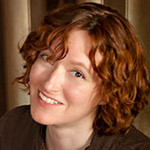Guest Post: Should you be a full-time writer?
by Mary Robinette Kowal
 A lot of writers have a goal of being a full time writer. I think there’s this image of your life continuing exactly as it is, except that now your job is writing. Sure, you know you won’t go into an office, but it will be so nice to have no demands on your time, except writing.
A lot of writers have a goal of being a full time writer. I think there’s this image of your life continuing exactly as it is, except that now your job is writing. Sure, you know you won’t go into an office, but it will be so nice to have no demands on your time, except writing.
Yeah… so, about that.
Writers are freelancers.
As someone who has spent most of her adult life as a freelancer, let me speak to those of you who have conventional day jobs. How comfortable are you with not knowing where your next paycheck is coming from, or even how big it will be?
Being a freelancer means that you have to constantly be hustling to get work. You get big checks when you turn in projects and nothing in between. Royalties? Twice a year and unpredictable in size.
When you are not writing, you are unemployed.
If this idea makes you uncomfortable, think very carefully before quitting your day job.
Your quality of life will change
You no longer need to leave the house. You won’t see people unless you make the effort to do so. Ah…. solitude. At first, yes. It’s glorious. But if you are even a minimally social creature… it can get really isolating really fast.
If you are a midlist writer (likely), you will have less money for indulgences. You might have to move to somewhere less expensive. Or travel less. Or you might have to travel more to promote the book. The only thing that is certain is that your life will not look the same as it does with the regularity of a dayjob.
There is no guarantee you will sell the next book.
This is the depressing thing that terrifies every writer. There comes a point in a writer’s career when they try to sell a book and can’t. Yes. Even New York Times Bestsellers. Even people who have won multiple awards. Don’t assume that you will sell books at the rate at which you can write them. I’ve sold seven novels, but I have three novels sitting in the trunk that we can’t sell. The only book you can count on income from is the one that you have already sold.
Diversify your income stream
One of the things a freelancer learns is that they must diversify their income stream in order to survive. This means having multiple clients and, often, having multiple types of work. For instance, as a puppeteer, I could sell my services as a performer, a designer, and a builder. I also did art direction, and occasionally gardening.
As a writer, my income stream comes from fiction, audiobook narration, puppet building, and teaching.
I could also have opted to do non-fiction, or editing, but the key is that I have money coming in from more than one source so that if one of them goes away, I have another way to pay the bills.
The side-effect of the multiple income streams is that you have multiple competing deadlines. Don’t like having more than one boss? Welcome to your new life. You now have a bajillion of them making demands on your time.
You don’t have to go full time.
It is totally okay to have writing as a second career. Anyone who sneers at you for keeping your dayjob for security is a judgemental prat. All a dayjob is doing is diversifying your income stream and giving you the ability to turn down work you don’t want to do. Believe me, there’s nothing as unpleasant as having to craft your way through a story you aren’t interested in just because you need the paycheck. Have I done that? Yes. Will I tell you which story? No.
But– is that part of why I record audiobooks? Yep. Sure, I enjoy it, but it also means that I don’t have to write things I don’t want to write.
How do I decide if I should quit?
Ask yourself these questions.
- Do I consistently have more paid writing work that I want to do than I have time for?
- Am I comfortable with a freelancer’s lifestyle?
- Are the changes in quality of life acceptable?
If the answer to ALL of those is “Yes” then by all means, take the leap.
But if you answer no, or hesitate… then I would really, really think twice before quitting the dayjob.
But my dayjob is soul sucking!
The answer might be to find a different day job that gives you more flexibility. If your job is eating up your energy, that’s a problem. But here’s the trick, you don’t have to have upward ambition in two different careers. If you want to be a writer and that’s where you want to focus your energy, then find a job that doesn’t require all of your attention. Be open about the fact that you are a writer when you are applying for a job that you’re over-qualified for so they understand why and that they won’t lose you to a better job.
During of the two periods in which I had a day job, I was a receptionist. As long as I got my work done, my boss not only didn’t mind the fact that I was writing a novel, he actively encouraged it.
Did that mean I was a part-time writer? Yep.
And being a part-time writer is totally okay. It’s fine to write one book every ten years. When people tell you that you won’t have a career that way, what they mean is that you can’t support yourself. But if that’s all the writing you want to do, then writing one book every ten years does not invalidate you as a writer.
So, should you go full time? I don’t know. That depends on you and what will make you happy.
(If you’ve made the jump from part-time writer to full-time writer, I’d love to hear about how and why you did. And if you ever regretted it.)
•••
 Mary Robinette Kowal is the author of Shades of Milk and Honey (Tor, 2010) and Glamour in Glass (Tor, 2012). In 2008 she received the Campbell Award for Best New Writer, and in 2011, her short story “For Want of a Nail” won the Hugo Award for Short Story. Her work has been nominated for the Hugo, Nebula and Locus awards. Her stories appear in Asimov’s, Clarkesworld, and several Year’s Best anthologies. She served two terms as SFWA’s vice president. Mary, a professional puppeteer, also performs as a voice actor, recording fiction for authors such as Seanan McGuire, Cory Doctorow and John Scalzi. She lives in Chicago with her husband Rob and over a dozen manual typewriters.
Mary Robinette Kowal is the author of Shades of Milk and Honey (Tor, 2010) and Glamour in Glass (Tor, 2012). In 2008 she received the Campbell Award for Best New Writer, and in 2011, her short story “For Want of a Nail” won the Hugo Award for Short Story. Her work has been nominated for the Hugo, Nebula and Locus awards. Her stories appear in Asimov’s, Clarkesworld, and several Year’s Best anthologies. She served two terms as SFWA’s vice president. Mary, a professional puppeteer, also performs as a voice actor, recording fiction for authors such as Seanan McGuire, Cory Doctorow and John Scalzi. She lives in Chicago with her husband Rob and over a dozen manual typewriters.
Visit www.maryrobinettekowal.com or her journal, where this post first appeared.


